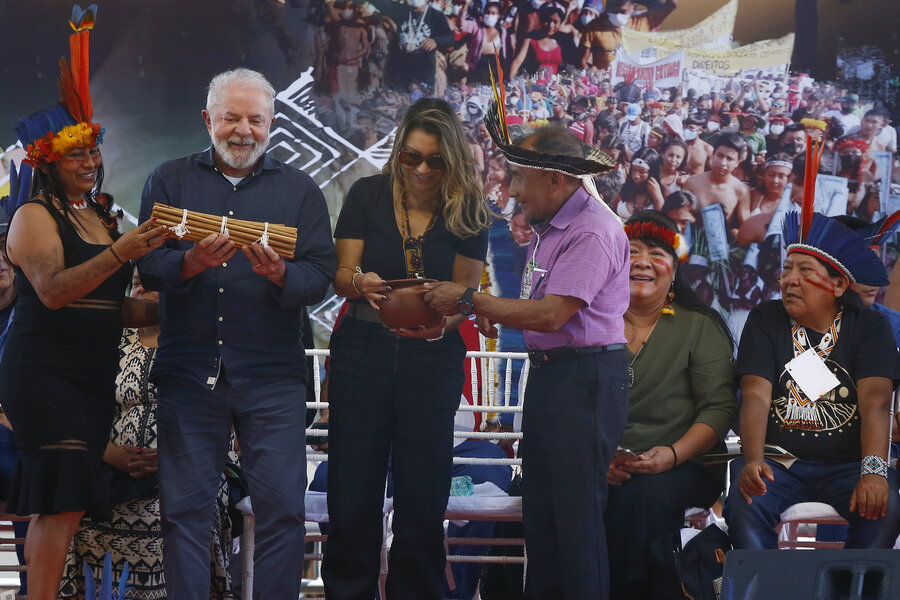Brazil's Lula vows to legalize Indigenous lands amid rising conflicts
Loading...
| Raposa Serra Do Sol Indigenous Territory, Brazil
On his first trip to Indigenous land in the Amazon rainforest since taking office, Brazilian President Luiz Inácio Lula da Silva expressed support for creating new territories for those communities, but stopped short of announcing any demarcations.
Wearing a white cap and dark shirt in the heat, Mr. Lula addressed some 2,000 Indigenous people who painted their faces, wore traditional feather headdresses, and sang songs to welcome him Monday to the Raposa Serra do Sol region bordering Venezuela and Guyana.
He said he wants quick demarcation of their lands “before other people take over, invent false documents” to claim ownership rights. That has been a common occurrence throughout Brazil’s history, which prompted the start of demarcation processes over a half-century ago.
“We need to quickly try to legalize every land whose [demarcation] studies are almost finished so the Indigenous can take the land that is theirs,” Mr. Lula said at the 52nd general assembly of the Indigenous peoples of the State of Roraima.
Yet Mr. Lula stopped short of actually announcing any new designations that are much anticipated by Indigenous people and rights activists. Many already had their hopes dashed that new demarcations would take place in the first 30 days of his administration, which began Jan. 1.
Their movement has pressured Mr. Lula to demarcate 13 new Indigenous territories that have cleared all regulatory steps and require nothing more than presidential approval to be official. Doing so would mark a sharp change in policy from the previous administration of Jair Bolsonaro, who did not demarcate any land for them during his presidency.
Some of the territories pending presidential authorization began their demarcation processes decades ago.
Mr. Lula authorized the demarcation of Raposa Serra do Sol in 2005, during his first term as president. Different from other reserves in the Brazilian Amazon, Raposa Serra do Sol is mostly tropical savannah. It is home to 26,000 people from five different ethnicities.
Since receiving its protected status, it has been a scene of conflict between rice farmers and Indigenous people and has had sporadic violence, making the territory something of a case study in the challenges of protecting land that is increasingly under pressure from without.
Mr. Bolsonaro’s relentless push to legalize mining on Indigenous territories rekindled long-standing divisions among Raposa Serra do Sol’s local communities about the best path forward for their collective well-being. He visited an illegal gold mining camp in the same Indigenous territory in October 2021 and openly encouraged the activity, despite criticism from local Indigenous leaders.
Preparations for Mr. Lula’s arrival at Raposa Serra do Sol began shortly before daybreak in the Amazon, with Indigenous people of different groups waking early to gather at a community center for their final rehearsal of songs and dances for the president. People of different ages wearing straw skirts lurched backward and forward as drums and chants resounded. Other Indigenous people were back at their tents preparing breakfast for the members of their groups.
Indigenous leaders, including Osmar Lima Batista of the Macuxi people, Letícia Monteiro da Silva of the Taurepang people, and Adailton Waiwai of the Waiwai people, told The Associated Press at the meeting that they expect better days compared with the prior four years, when they believed they did not have a friend in the presidential palace.
All agreed that Mr. Lula’s first visit to the region since 2010 was not enough, however.
Davi Kopenawa, leader of the Yanomami people, took the microphone during the gathering to tell Mr. Lula that his people’s needs are greater than those of four years ago.
“After we take the gold miners out, we need to recover our Indigenous health care system, which was destroyed,” Mr. Kopenawa said. “We need to save the children we have left. I don’t want more children dying. We need hospitals in our community. Disease is still strong in the Amazon.”
“I don’t want mining on Yanomami lands and in the Raposa Serra do Sol territory,” he added. “Mining kills us, it kills people in the city, the river, the water of the forest. We don’t need heavy mining at our home.”
Mr. Lula said in his speech that his administration will definitively expel gold miners from Indigenous lands – as it has already begun working to do in the Yanomami territory.
“That gold doesn’t belong to anyone. It’s there because nature placed it there. It’s on Indigenous land,” Mr. Lula said.
The president was accompanied by Sonia Guajajara, his minister of Indigenous peoples, and Joenia Wapichana, who heads the Indigenous affairs agency.
Mr. Lula said there will be a meeting involving leaders of countries of the Amazon rainforest – Bolivia, Colombia, Ecuador, Peru, and Venezuela.
This story was reported by The Associated Press.







